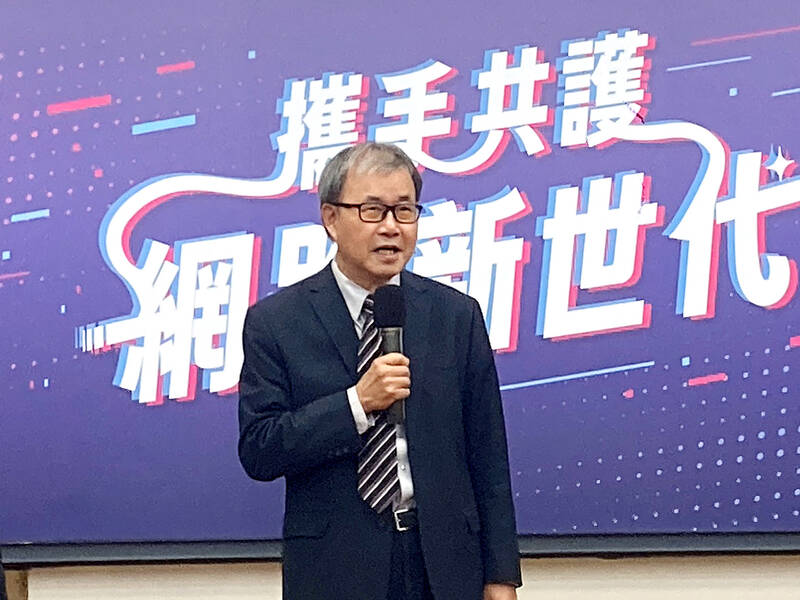Schools are to ban students from bringing phones or other mobile devices to classrooms, starting in September, Minister of Education Cheng Ying-yao (鄭英耀) said yesterday.
He made the comment at a news conference at the ministry, saying that officials are soon to unveil guidelines authorizing teachers to take students’ phones for safekeeping.
The ministry in March began working with officials, educators and civil society groups to deal with the endemic gadget use on campuses, resulting in the guidelines’ creation, he said.

Photo: Yang Mien-chieh, Taipei Times
The school rules, which apply to elementary schools, junior high schools and high schools, would enable educators to collect students’ mobile devices in a centralized location on campus, he said.
Exceptions and alternative methods would be available to schools where the policy could not be implemented, he said.
The scientific literature has shown that allowing students to use Internet-connected devices in classrooms is harmful to their ability to learn, Cheng said.
The soon-to-be-revealed government guidelines for phones on campus are part of the ministry’s larger policy package dealing with the implications of digital technology on learning, he said.
Instruction materials for families to regulate their children’s Internet usage, information campaigns targeting parents, on-campus initiatives and other drives to raise public awareness are to be rolled out, he said.
Efforts by local educators to ban phones in classrooms have already faced a backlash from students at some schools.
New Taipei City Municipal Banqiao Senior High School principal Liu Shu-fen (劉淑芬), who had implemented a cellphone ban in her former postings, was greeted by banners calling for her removal placed throughout the campus at the school’s anniversary celebrations last week.
The banners bore slogans that said: “Out with Shu Fen the despot,” “authoritarians not wanted at Banqiao High” and “unite for the spirit of freedom,” among others.
Some students on a student-run Facebook page said that the incoming principal must pledge to protect their rights and respect the school’s tradition of students’ self-governance, or face protesters prepared to resist her “to the bitter end.”

The Coast Guard Administration (CGA) yesterday said it had deployed patrol vessels to expel a China Coast Guard ship and a Chinese fishing boat near Pratas Island (Dongsha Island, 東沙群島) in the South China Sea. The China Coast Guard vessel was 28 nautical miles (52km) northeast of Pratas at 6:15am on Thursday, approaching the island’s restricted waters, which extend 24 nautical miles from its shoreline, the CGA’s Dongsha-Nansha Branch said in a statement. The Tainan, a 2,000-tonne cutter, was deployed by the CGA to shadow the Chinese ship, which left the area at 2:39pm on Friday, the statement said. At 6:31pm on Friday,

The Chinese People’s Liberation Army Navy’s (PLAN) third aircraft carrier, the Fujian, would pose a steep challenge to Taiwan’s ability to defend itself against a full-scale invasion, a defense expert said yesterday. Institute of National Defense and Security Research analyst Chieh Chung (揭仲) made the comment hours after the PLAN confirmed the carrier recently passed through the Taiwan Strait to conduct “scientific research tests and training missions” in the South China Sea. China has two carriers in operation — the Liaoning and the Shandong — with the Fujian undergoing sea trials. Although the PLAN needs time to train the Fujian’s air wing and

The American Institute in Taiwan (AIT) put Taiwan in danger, Ma Ying-jeou Foundation director Hsiao Hsu-tsen (蕭旭岑) said yesterday, hours after the de facto US embassy said that Beijing had misinterpreted World War II-era documents to isolate Taiwan. The AIT’s comments harmed the Republic of China’s (ROC) national interests and contradicted a part of the “six assurances” stipulating that the US would not change its official position on Taiwan’s sovereignty, Hsiao said. The “six assurances,” which were given by then-US president Ronald Reagan to Taiwan in 1982, say that Washington would not set a date for ending arm sales to Taiwan, consult

A Taiwanese academic yesterday said that Chinese Ambassador to Denmark Wang Xuefeng (王雪峰) disrespected Denmark and Japan when he earlier this year allegedly asked Japan’s embassy to make Taiwan’s representatives leave an event in Copenhagen. The Danish-language Berlingske on Sunday reported the incident in an article with the headline “The emperor’s birthday ended in drama in Copenhagen: More conflict may be on the way between Denmark and China.” It said that on Feb. 26, the Japanese embassy in Denmark held an event for Japanese Emperor Naruhito’s birthday, with about 200 guests in attendance, including representatives from Taiwan. After addressing the Japanese hosts, Wang